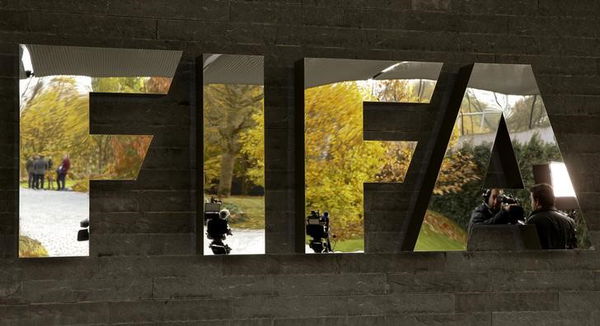
via Reuters
Journalists are reflected in FIFA’s logo as they wait during an extraordinary meeting of the FIFA Executive Committee in front of FIFA’s headquarters in Zurich, Switzerland October 20, 2015. REUTERS/Arnd Wiegmann

via Reuters
Journalists are reflected in FIFA’s logo as they wait during an extraordinary meeting of the FIFA Executive Committee in front of FIFA’s headquarters in Zurich, Switzerland October 20, 2015. REUTERS/Arnd Wiegmann
By Joshua Franklin
ZURICH (Reuters) – FIFA has approved five candidates for its February presidential election amid the worst crisis in its history, after barring Liberia’s Musa Bility on integrity grounds and leaving out UEFA chief Michel Platini while he remains under suspension.
Platini, the original favourite to succeed Sepp Blatter as head of global soccer’s governing body, was not admitted because he has been suspended for 90 days pending a full Ethics Committee investigation.
ADVERTISEMENT
Article continues below this ad
FIFA had already announced that it would not process former French international football star while he was suspended, but could review its position if he wins an appeal against the ban.
Buffeted by a series of scandals over the last few years, FIFA was thrown into turmoil in May by the U.S. indictments of 14 football officials, including two FIFA vice-presidents, and sports marketing executives for alleged corruption.
Blatter, also suspended for 90 days, is facing criminal investigation in Switzerland over a 2 million Swiss franc ($2.1 million) payment from FIFA to Platini. Both men have denied wrongdoing.
FIFA’s electoral committee said on Thursday the five approved presidential candidates were Prince Ali Bin Al Hussein of Jordan, Asian Football Confederation President Sheikh Salman Bin Ebrahim Al Khalifa of Bahrain, former FIFA official Jerome Champagne of France, UEFA General Secretary Gianni Infantino of Switzerland and South Africa businessman Tokyo Sexwale.
“The integrity check included a review of corporate records, litigation cases, bankruptcy proceedings, potential regulatory actions taken against the candidate and a review of media reports concerning potential red flags (fraudulent behaviour, match manipulation, human rights violations, etc.),” the committee said in a statement.
Bility was not admitted “in view of the content of the integrity check report relating to him”, it said.
“For reasons of protection of personality rights, the Ad-hoc Electoral Committee – while it has explained its considerations in detail to Musa Hassan Bility – will not comment publicly on the specifics of its decision.”
Salman has dismissed as “false, nasty lies” allegations that he was involved in human rights abuses against pro-democracy activists during a 2011 uprising in Bahrain when he was head of the Gulf Arab country’s football association.
The electoral committee said it had “assessed any allegations against the candidates carefully, including those against Sheikh Salman concerning his alleged involvement into the events in Bahrain in 2011”.
It said no evidence of “any personal and direct involvement” by Salman in rights abuses had been found, so the committee had upheld his candidacy.
There are no clear favourites to win the election, in which each of the 209 national associations (FAs) who are affiliated with FIFA hold one vote.
ADVERTISEMENT
Article continues below this ad
Critics say they are heavily influenced by the continental confederations, such as Europe’s UEFA or Africa’s CAF, which sometimes ask their members to vote as a bloc for one candidate. But as voting is secret, FAs can easily disobey their confederations without being detected, which makes voting unpredictable.
Infantino announced his intention to stand only one day before the registration deadline in October, and is expected to withdraw if Platini is allowed back into the race.
Last month, Sheikh Ahmad Al-Fahad Al-Sabah, one of the top powerbrokers in global sport and a member of FIFA’s executive committee, said he hoped there would be “coordination” between Infantino and Sheikh Salman if Platini was unable to run.
ADVERTISEMENT
Article continues below this ad
Champagne has alleged that already in this election “there is a pre-campaign of arrangements in five-star hotels behind closed doors”. He was alluding to alleged back-room deals in which certain candidates do not run against each other and one then drops out to clear the way for the other to win.
(Reporting by Joshua Franklin; Writing by Brian Homewood in Berne; Editing by Michael Shields and Mark Heinrich)

